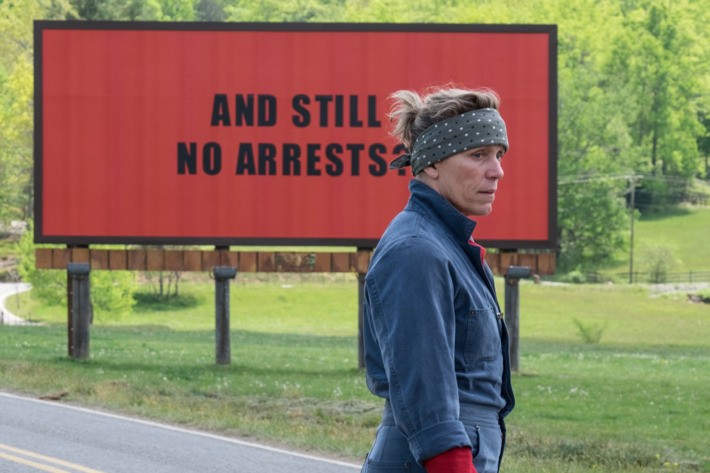For me, there’s nothing more satisfying than seeing a movie where everything clicks into place with utter perfection. Despite the incredible messiness of the story, situation, and characters’ lives, Three Billboards Outside Ebbing, Missouri is one of those films.

Frances McDormand in Three Billboards Outside Ebbing, Missouri
It’s remarkable that a work of art that reaches this deeply into the soul of contemporary America would be written by an Irishman, but maybe it had to be. Maybe we’re too blinded by our own conflicts to see as clearly as Martin McDonagh, the playwright turned filmmaker most famous for the tricky crime comedy In Bruges. Three Billboards is steeped in bitter irony, but it is not by any stretch a comedy.
Come awards season, you’re going to be hearing a lot more about Francis McDormand’s performance as Mildred Hayes, the divorced, working class single mom in this rural outpost in the Ozarks. Mildred used to be a mother of two, but seven months ago her teenage daughter Angela was raped and murdered. Now she lives with her son Robbie (Lucas Hedges), stewing in guilt for her perceived failure to protect her child and simmering with rage at the police who still haven’t solved the horrific crime. Impulsively, she rents the titular advertising to send a public message to Sheriff Bill Willoughby (Woody Harrelson), hoping to embarrass him into action.
The easy thing to do for McDonagh would be to make Sheriff Wiloughby a moustache-twirling villain. But he’s not. Harrelson’s Willoughby may not be the most woke person in Missouri, but he is a hard working public servant who takes his oath of office seriously. He’s also working on a deadline, so to speak, having been diagnosed with cancer.
The same can’t be said for deputy Jason Dixon (Sam Rockwell), however. Dixon is a lazy, incompetent thug who was destined to be on one side of the carceral state or the other. His version of good police work is throwing the guy who owns the signs (Caleb Landry Jones) out of a second story window. McDonagh doesn’t let the characterization rest there, even though he could. Inside, Dixon is a weak, fearful person trapped in a toxic relationship with his alcoholic mother.
Three Billboards Outside Ebbing, Missouri
Nothing in Three Billboards is simple. As Mildred’s single minded quest for justice crosses the line into thirst for revenge, she starts to see herself in her abusive ex-husband Charlie (John Hawkes). McDormand’s performance is one for the ages, a highlight of one of the most distinguished careers in American cinema. Her facial control is at once appropriately stoic for a country woman who has worked every day of her adult life and deeply expressive of inner pain. On the outside, she’s tough as nails and determined as the tides. On the inside, she is wracked with doubt and fear. McDormand hovers in this difficult space the entire movie, even when she’s going on a date with Peter Dinklage, who is having entirely too much fun with his moustache.
The complexity and depth of McDonagh’s script reminded me of the work of Dalton Trumbo, the legendary Spartacus and Roman Holiday screenwriter who was expert at balancing social commentary with real character and down to earth drama. In the theaters as well as in real life, 2017 has been a year of extremes, with the incredible high points like Get Out and Logan Lucky putting the failure of big budget studio tentpoles in stark relief. Three Billboards Outside Ebbing Missouri is a rare and thoughtful masterpiece for our troubled times.